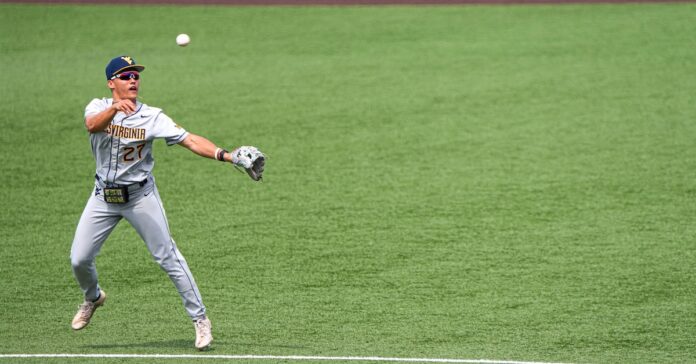Today is the start of the 2024 NCAA Division I baseball season, and to celebrate, I’ve updated my rankings for this draft class. Thirty fresh scouting reports, along with tool grades and assessments of the players’ physical attributes, are available on The Board. As they do every year, these rankings will grow and change between now and the draft. Let’s review the draft order before I talk a little bit about the class:
2024 MLB Draft Order
| First Round | |
|---|---|
| 1 | Cleveland Guardians |
| 2 | Cincinnati Reds |
| 3 | Colorado Rockies |
| 4 | Oakland Athletics |
| 5 | Chicago White Sox |
| 6 | Kansas City Royals |
| 7 | St. Louis Cardinals |
| 8 | Los Angeles Angels |
| 9 | Pittsburgh Pirates |
| 10 | Washington Nationals |
| 11 | Detroit Tigers |
| 12 | Boston Red Sox |
| 13 | San Francisco Giants |
| 14 | Chicago Cubs |
| 15 | Seattle Mariners |
| 16 | Miami Marlins |
| 17 | Milwaukee Brewers |
| 18 | Tampa Bay Rays |
| 19 | New York Mets |
| 20 | Toronto Blue Jays |
| 21 | Minnesota Twins |
| 22 | Baltimore Orioles |
| 23 | Los Angeles Dodgers |
| 24 | Atlanta Braves |
| 25 | San Diego Padres |
| 26 | New York Yankees |
| 27 | Philadelphia Phillies |
| 28 | Houston Astros |
| 29 | Arizona Diamondbacks |
| 30 | Texas Rangers |
| 31 | Arizona Diamondbacks (Received for Corbin Carroll winning ROY) |
| 32 | Baltimore Orioles (Received for Gunnar Henderson winning ROY) |
| 33 | Minnesota Twins (Compensation for Sonny Gray signing with St. Louis) |
| 34 | Milwaukee Brewers (Acquired from the Orioles in Corbin Burnes trade) |
| 35 | Arizona Diamondbacks |
| 36 | Cleveland Guardians |
| 37 | Pittsburgh Pirates |
| 38 | Colorado Rockies |
| 39 | Kansas City Royals |
*If a player who was rated as a preseason Top 100 prospect by MLB Pipeline, Baseball America, and/or ESPN (at least two of the three) and was on his team’s Opening Day roster goes on to win Rookie of the Year, the club is awarded a PPI pick after the first round.
+If a team that loses a qualifying free agent is a revenue-sharing recipient and the free agent signs for at least $50 million, the team is awarded a pick between the first round and Competitive Balance Round A.
^Teams that have either one of the 10 smallest markets or 10 smallest revenue pools receive an additional pick at the end of the first or second round. The groups of teams alternate between the two rounds each year.
This year’s draft class isn’t great. The high school class is especially thin and relatively devoid of high-end position player talent. There will undoubtedly be players who ascend this spring and put themselves in the mix for an early first round pick, just as there will be players who flop or get hurt and fall away from the pinnacle of teams’ draft boards. There is one uber-talented freak near the top of the draft board: two-way Florida Gator Jac Caglianone. He is the player in this draft most likely to be a household name by selection day. There are also several stable, well-rounded hitters currently near the top of the class, but few of them have a great chance of developing meaningfully more power in pro ball. Most of them are physically maxed-out and are more likely to be solid, quick-moving big leaguers than superstars.
How Cleveland approaches their pick at 1.1 will be fascinating. This is a team that rarely sends scouts to college games, instead overwhelmingly utilizing data and video to evaluate that demographic of player. Without an awesome high schooler near the top of the draft, will the Guardians alter their M.O. and take a targeted, in-person approach to gauging their options? They haven’t picked at the very drop of the draft since selecting Clint Frazier fifth overall in 2013.
The Arizona Diamondbacks, the reigning NL pennant winners, will be the first team to pick for a second time and possess three of the top 35 picks (No. 29, 31, and 35; Colorado has three of the top 42 (pick No. 3, 38, and 42). The Guardians pick a second time in Competitive Balance Round A (pick No. 36) and, especially if they cut a deal at No. 1, the money they have to play with from winning the first overall selection and its accompanying slot value might threaten the plans of teams picking in that area that can’t compete with Cleveland’s bonus pool. The relative dearth of high school talent should push readers to consider following college baseball more closely this season since a greater portion of the highly drafted players are going to come from that demographic.

